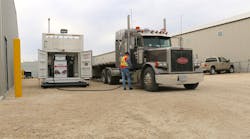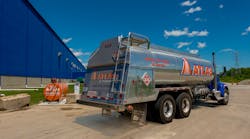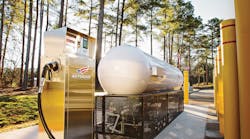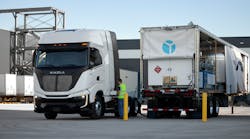On-site fuel tanks have long been a cost-saving solution for fleet owners looking to drive down fuel costs. After all, they enable businesses to purchase fuel in bulk and greatly reduce the time employees spend refueling. As fleet managers look for new ways to decrease operating expenses, they may be surprised to discover that modern fuel storage solutions save more than anticipated. Advanced on-site and remote monitoring systems now make it easier than ever to oversee consumption and control costs. Here are a few key benefits of modern fuel tank monitoring systems.
Schedule fuel deliveries
The most obvious benefit of monitoring fuel usage is knowing when to order more. Running out of fuel, whether through oversight or negligence, can grind an operation to a halt or leave a business at the mercy of current market prices. On new tanks, remote cloud-based fuel tracking systems help businesses monitor and manage supplies from anywhere, and make it easy to know when it’s time for a bulk delivery. This keeps businesses ahead of the curve, removing the potential for downtime and expenses associated with a mistimed fuel delivery.
Spot discrepancies
When managers know exactly what their regular fuel consumption looks like, it’s much easier to notice discrepancies. Things like nighttime or weekend refuels, for example, if out of the ordinary, could indicate fuel theft. A sudden spike in fuel consumption could also indicate that something is wrong with a vehicle or piece of equipment. Knowing how things should look makes it easy to pinpoint abnormalities and, with remote cloud-based systems, managers can view and analyze this data from their office, or even their home. Furthermore, accurate data tracking helps zero in on vehicle efficiency when completing cost-benefit analysis for vehicle upgrades.
Track dispensing
Fuel management and dispensing systems also allow for secure 24/7 refueling without an attendant. On many new tanks, cardlock systems efficiently enable authorization of certain individuals to dispense fuel and can also track fuel use by employee, time of day and volume. Another type of fuel tracking system matches barcodes from individual pieces of equipment to the fuel system to track fuel consumption for each vehicle while prohibiting the fueling of vehicles without a scan code.
Many businesses simply expect 2 to 5 percent of the annual fuel supply to go unaccounted. For a fleet purchasing 200,000 gallons of $2-per-gallon diesel each year, this means $8,000 to $20,000 of fuel lost. By monitoring dispensing with a cardlock system, employers can prevent employees and others from filling personal vehicles and greatly reduce losses.
Cardlock systems also serve as an effective deterrent for thieves. While some operations rely on padlocks, they are easy to cut on most tanks and do little to prevent theft. While adding a cardlock system will bump up the initial tank price, preventing a single theft of 50 gallons — roughly the capacity of a diesel pickup — can offset the difference.
Fuel consumption
By breaking down fuel costs by employee and vehicle, it becomes easy to accurately track overall expenses for specific contracts and jobs. This helps ensure jobs stay within budget as well as to predict costs for future contracts.
With the right options, today’s on-site tanks can simplify fuel management and serve as more of an asset than the large steel cylinders they once were. Ultimately, adding fuel monitoring systems to fuel tanks can help businesses cut expenses, anticipate future needs and increase profits — things that everyone can get behind.
Tim Doling is key accounts manager – construction and infrastructure at Western Global. Western Global is a designer and manufacturer of tanks and equipment for fuel and fluid handling. The company offers a range of solutions for the transportation and storage of fuel, diesel exhaust fluid, lubricants and more.




